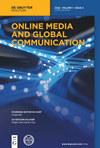什么因素影响公众对塑料废物管制政策和绿色消费的支持?证据来自27个欧洲国家的调查数据的多层次分析
引用次数: 0
摘要
摘要目的本研究调查了个人和国家层面的因素对公民成员对塑料垃圾的态度和行为的影响。在个人层面,它评估了传统媒体、在线社交网络和其他互联网来源的环境新闻使用的多样性对公众支持塑料垃圾相关政策和绿色行为的影响。设计/方法/方法我们利用了欧洲晴雨表从27个欧洲国家收集的二次调查数据。结果两级分析表明,性别、年龄、政治意识形态、风险认知以及最重要的环境新闻使用来源多样性等因素与参与者对塑料垃圾的政策支持和绿色行为呈正相关。这项研究还发现了几个国家层面的变量对塑料垃圾的绿色行为的影响。影响在评估对塑料垃圾控制的支持时,需要考虑两个层面(即国家和个人)的各种因素,以动员公众。研究结果表明,将社会认知理论的理论模型扩展到包括更多国家层面的因素,特别是在跨国比较中。原创性/价值这项研究有助于理解可能影响塑料垃圾公共政策支持和绿色行为的因素。本文章由计算机程序翻译,如有差异,请以英文原文为准。
What influences public support for plastic waste control policies and green consumption? Evidence from a multilevel analysis of survey data from 27 European countries
Abstract Purpose This study investigates the influence of individual- and country-level factors on citizen members’ attitude and actions regarding plastic waste. At the individual level, it assesses the influence of the diversity of environmental news use from traditional media, online social networks, and other internet sources on the public’s support for policy and green behaviors related to plastic waste. Design/methodology/approach We utilized secondary survey data collected from 27 European countries by Eurobarometer. Results The two-level analysis show that several individual factors including gender, age, political ideology, risk perception, and most importantly diversity of sources in environmental news use, from all three types of media sources, was positively associated with participants’ policy support and green behaviors related to plastic waste. This research also found the influence of several country-level variables on green behaviors toward plastic waste. Implications When assessing support for plastic waste control, various factors at both levels (i.e., country and individual) need to be considered to mobilize the public. Findings suggest extending the theoretical model of social cognitive theory to include more country-level factors especially in cross-national comparison. Originality/value This study shed lights on understanding factors that could influence public policy support and green behaviors with regards to plastic waste.
求助全文
通过发布文献求助,成功后即可免费获取论文全文。
去求助
来源期刊

Online Media and Global Communication
Communication, Media Studies, Internet Studies, International Studies, International Relations-
自引率
0.00%
发文量
0
期刊介绍:
Online Media and Global Communication (OMGC) is a new venue for high quality articles on theories and methods about the role of online media in global communication. This journal is sponsored by the Center for Global Public Opinion Research of China and School of Journalism and Communication, Shanghai International Studies University, China. It is published solely online in English. The journal aims to serve as an academic bridge in the research of online media and global communication between the dominating English-speaking world and the non-English speaking world that has remained mostly invisible due to language barriers. Through its structured abstracts for all research articles and uniform keyword system in the United Nations’ official six languages plus Japanese and German (Arabic, Chinese, English, French, Russian, Spanish, Japanese, and German), the journal provides a highly accessible platform to users worldwide. Its unique dual track single-blind and double-blind review system facilitates manuscript reviews with different levels of author identities. OMGC publishes review essays on the state-of-the-art in online media and global communication research in different countries and regions, original research papers on topics related online media and global communication and translated articles from non-English speaking Global South. It strives to be a leading platform for scientific exchange in online media and global communication.
For events and more, consider following us on Twitter at https://twitter.com/OMGCJOURNAL.
Topics
OMGC publishes high quality, innovative and original research on global communication especially in the use of global online media platforms such as Facebook, TikTok, YouTube, Twitter, Instagram, WhatsApp, Weibo, WeChat, Wikipedia, web sites, blogs, etc. This journal will address the contemporary concerns about the effects and operations of global digital media platforms on international relations, international public opinion, fake news and propaganda dissemination, diaspora communication, consumer behavior as well as the balance of voices in the world. Comparative research across countries are particularly welcome. Empirical research is preferred over conceptual papers.
Article Formats
In addition to the standard research article format, the Journal includes the following formats:
● One translation paper selected from Non-English Journals that with high quality as “Gems from the Global South” per issue
● One review essay on current state of research in online media and global communication in a country or region
 求助内容:
求助内容: 应助结果提醒方式:
应助结果提醒方式:


